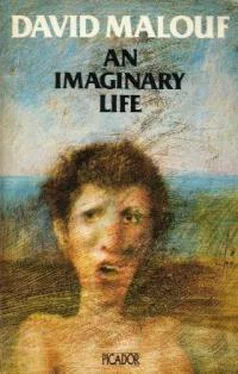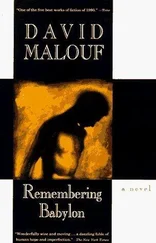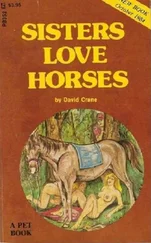I think also, in these quiet hours, of my brotherґs death during the Parilia, just after our birthdays, which fall on the same day. We have always been close, though our temperaments are so different; he is serious-minded, and filled with a deep sense of loyalty to things, to my father, to the farm, whose every boundary stone he knows, to the family, which is so closely bound up with the country here, the old tribal lands of the Peligni. He is deeply pious, in a way I respect and envy, but having taken on early my role as the frivolous one, I do as I am expected to do, and tease him about it. For days he lies ill and cannot speak. He is just eighteen. I sit with him in a room off the courtyard, where he lies sweating on a daybed, breaking out in cold shivers, then burning. I read to him a little, but he cannot attend. I hold water to his lips and feel my hand trembling as he drinks. I weep and am ashamed of it. When the day of the Parilia comes I go out heavyhearted as the twilight gathers to do the duty that is his, to do it for him, as he would do it, and am aware as I cross the yard of the womenґs eyes on me, and as I stride out across the fields to where the little fires are already blowing in the dark, I know that if I allow myself even for a moment to believe in the ceremony I am about to perform, as he does, I will have replaced him, made him superfluous, since I will be assuring the gods (who do not exist) that I am there to take his place.
I wade uphill through the yellow grass, hardening my heart, though this in fact is a festival I have always loved, ever since I first went out on my fatherґs shoulders to watch the fires lit and to see the menґs shadows leaping against the corn. I too know all the boundary stones of our land, but to me they mean something different. They are where the world begins. Beyond them lies Rome and all the known world that we Romans have power over. Out there, beyond the boundary stones, the mystery begins. My mind ventures out, touches the old worn boulders for luck, and then goes on in the dark, populating the unknown with what must be imagined since it cannot be seen. For my brother, I know, the farm and his mind are one. The stones glow at the edge of what he is: these fields that have been cleared of their pebbles and terraced, these ancient olives, with their gnarled trunks so thick that you can hide in them, as the wood spirits do, these vineyards, beehives, slopes of corn streaming with light under the moon. I walk through all this, feeling the grass heads brush my bare legs, and arrive at the field where my father is waiting. He has already made his course and is drying his body with a cloth. I kiss him. I leg a slave loosen my cloak. I sip from the pail of milk. Take in my hand the beanstalk and the ashes of the calf. My father dips a laurel branch in water and sprinkles me with it. He is weeping. My chest, my brow. I blink under the shower of little drops.
The heaps of straw are kindled all the way down the field for me to leap over, and as I sprint away and go flying over the first of them, feeling the rush of air into my lungs, feeling the joy of it, the leaping, the being cleansed and gathered into the web of things, smoke from the straws, dusky twilight, nightjars swooping after insects among the pines, the springing of the young plants under me, I know that it has happened - I have let some grain of belief in all this sprout in my mind, and killed him. My brother is dead. I feel it as a fact in my limbs, in their weariness as I come round to the start, in my own breathlessness as I lean forward, hands on hips, and gasp for air. I feel it, guiltily, in the glow that comes to my body after the exercise. I have run my brother’s death. When they sprinkle me a second time with the laurel and I start back across the darkening fields, feeling my sweat dry in the breeze, it is to what I know has already occurred. I stop at the entrance to the yard and listen for the first wailings from the house, and hear them, the women’s voices. Sitting at the edge of the field, in the dark, I loosen my sandals. I strew my shoulders, my legs, my hair, with earth and know obscurely what it is I am about. I am trying to wipe out the purification that was his, I am atoning for my own moment of belief.
So these things happen, deep in our lives. We do not speak of them. We hide them even from ourselves, but they do not leave us. For all our mockery of the earth we have come from, it covers us, we creep back to it, to its thickness on our limbs, its grit in our mouths. I killed something in myself on that night and tried to cover it with earth. Now it cries out in me again. I find myself wishing that I could talk to my father once again, after all these years of estrangement, and tell him that I have found my way back to that country I will never see again and am at home. I have admitted at last its claims upon me. I know where I was born.
And that brings my mind back, as always, to the Child. What is his country? What is his parentage? At what moment did he push out into the world, under what star sign, with what planet in the ascendant, in what ephemeris of the moon? And if he does not know these things can he ever know who he is or what his fate is to be?
Or does not knowing make him free?
Each morning now we go out, the Child and I, to practice our lessons in the open, where the boy and the women of the house cannot listen.
The Child carries the colored ball, which has become his talisman, his first possession among us; he never lets it go. In sleep he curls up around it. While eating he places it in the crook of his knee as he squats cross legged with the bowl in his lap, handling awkwardly, at last, the wooden spoon I have taught him to use. When we are out walking he carries the ball in his left hand.
I avoid the places where we are likely to come across people from the village: women beating their clothes on the pebbles or laying them out to dry in the thorn brush; men driving their ox ploughs to the narrow fields at the edge of the stockade where our meager crop of oats is grown. I avoid too the little grove to the west which is sacred to the women, and where at certain phases of the moon they sacrifice to Heacate with the entrails of a dog.
This leaves only the swampy land towards the river. I take off my sandals (the boy goes barefoot, and bare except for a loose robe, which he tears off as soon as we are out of sight of the village) and we wade through the rushes to a turfy island covered with scrub and a few stalks of wild oats; and there, each morning, with the swamp birds invisible around us, creaking and calling, or climbing heavily into the watery sky, and the frogs tinkling, we begin.
I am teaching the Child to speak.
It is a difficult process. I have long since discovered on our expeditions together that he can imitate any of the birds or animals we come across, and he delights in showing off to me how he can whistle like the big hawks we see occasionally floating high up under the clouds or throw his voice, pic pic, against the bole of a tree, like the woodpeckers of my childhood, the sacred spirits of our Sulmo countryside. He stands with his feet apart, hands on hips, head held back to the light, and his lips contort, his features strain to become those of the bird he is mimicking, to become beak, crest, wattles, as out of his body he produces the absolute voice of the creature, and surely, in entering into the mysterious life of its language, becomes, for a moment, the creature itself, so that to my eyes he seems miraculously transformed.
Sometimes he uses his hands like an instrument to trill and flute, blowing across his fist and fluttering his fingers. At other times the cry simply floats out of him, high and clear, or the warbling comes from deep in his throat, a guttural murmuring, or his body suddenly gives forth a metallic creaking so that I am startled by its closeness. It is as if each of the various bird species - ground pigeons, crows, waders, high-flying migratory birds that have been who knows where over the horizon - had their life in him and could be drawn out on the breath between his lips; as if he had some entrance to their mysterious comings and goings among the grasses, or had been with them to the bottom of the river where the water birds diver after their prey, or in the high places of the air where imagination fails to follow them or to catch with the ear how their cries are translated at the margin of the stars.
Читать дальше












